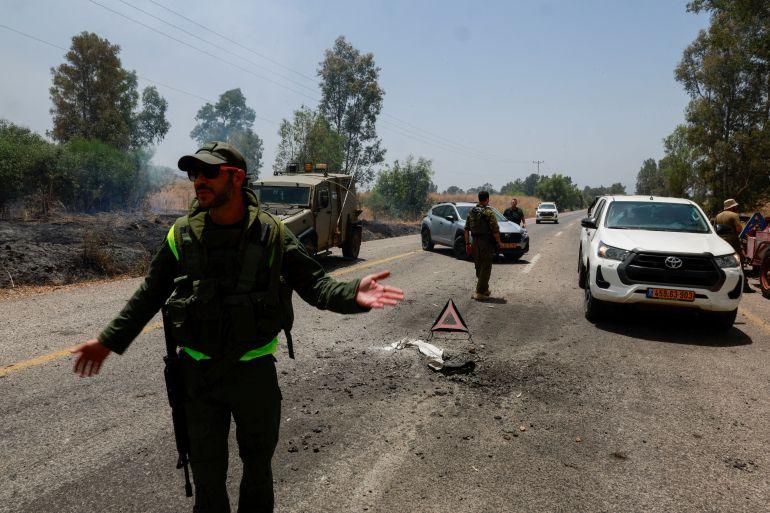Source: ALJAZEERA
ALJAZEERA MEDIA NETWORK

Amos Hochstein plans to visit Lebanon as fears increase over potential full-scale conflict between Hezbollah and Israel.
An influential US diplomat has convened with Israeli officials and is expected to visit Lebanon soon in a bid by Washington to ease the growing tension between Israel and Hezbollah.
US envoy Amos Hochstein arrived in Israel on Monday, engaging in discussions with Prime Minister Benjamin Netanyahu, President Isaac Herzog, and Defense Minister Yoav Gallant.
Gallant's office reported that the minister briefed Hochstein on the northern border situation, highlighting the frequent Hezbollah attacks and the Israeli military’s countermeasures against Hezbollah's operatives and infrastructure.
"Minister Gallant and Mr. Hochstein extensively discussed the regional security situation and its broader implications," the office stated.
Hochstein’s visit is seen against the backdrop of escalating concerns over a potential full-blown war between Israel and Hezbollah, which could have wider regional repercussions.
Hezbollah had intensified its assaults on Israel following the assassination of a key commander in an Israeli air raid on southern Lebanon a week ago.
Nevertheless, the Iran-backed group, which has been persistently targeting Israeli military spots since the onset of the Gaza war, has not launched any new attacks since Saturday evening.
The current pause, occurring during the Eid al-Adha holiday, might be related to Hochstein’s regional visit.
On Monday, the Israeli military reported killing a Hezbollah member in a drone attack, identifying him as a significant figure in the group’s rocket division.
The Wall Street Journal noted that Hochstein is engaging in indirect negotiations with Hezbollah via Lebanese Parliament Speaker Nabih Berri, who is allied with the group.
These discussions are focused on a tentative agreement to cease hostilities, according to the newspaper.
Later on Monday, President Joe Biden's administration emphasized its desire to prevent escalation at the Lebanon-Israel border and hinted at a US proposal to avert a large-scale conflict.
"There's a diplomatic solution within reach that could resolve this situation without resorting to war," said State Department spokesperson Matthew Miller.
Hochstein, officially titled as the special presidential coordinator for global infrastructure and energy security, has been instrumental in brokering a 2022 agreement to settle a maritime border dispute between Lebanon and Israel related to Mediterranean oilfields, making him a de facto envoy for both nations.
He has made recurrent visits to the region in recent months.
The US has reiterated its preference for a diplomatic solution concerning the Lebanon-Israel border situation. However, Hezbollah insists it will continue its offensives until the conflict in Gaza concludes.
The Lebanese group commenced its attacks on northern Israeli military facilities a day after the Gaza war erupted on October 7, positioning it as a “support front” for Palestinian militants.
Israel retaliated by bombing southern Lebanese villages and targeting Hezbollah sites, although hostilities remain concentrated around the border area.
Israeli leaders have vowed to repel Hezbollah from their northern frontiers. "We aim to resolve this either through diplomatic means or military action," Israeli government spokesperson David Mencer stated on Monday.
"The current situation, with 5,000 rockets bombarding our northern area and making it uninhabitable, is untenable."
The ongoing conflict has displaced countless individuals on both sides of the border, adding to the pressure on Netanyahu’s government, which is striving to curb Hezbollah and achieve its strategic objectives in Gaza.
On Monday, Netanyahu disbanded his war cabinet, a week after political adversary Benny Gantz exited the emergency government organized to manage the war in Gaza.
Some Israeli officials advocate for a more aggressive stance against Hezbollah's strikes.
Concurrently, the US is advocating for a Gaza truce, which it believes might pave the way for easing tensions between Hezbollah and Israel.
“We believe the optimal path to a northern diplomatic resolution—preferred by all sides—is achieving a ceasefire in Gaza,” Miller articulated.
Last week, Gallant declined a French proposal for collaborative efforts by Israel, France, and the US to prevent war at the Lebanese border.
“As we defend our people in a just war, France has adopted a hostile stance against Israel,” Gallant remarked. “France overlooks the severe atrocities committed by Hamas on Israeli citizens. Israel will not participate in the tripartite framework proposed by France.”
Your email address will not be published. Required fields are marked *